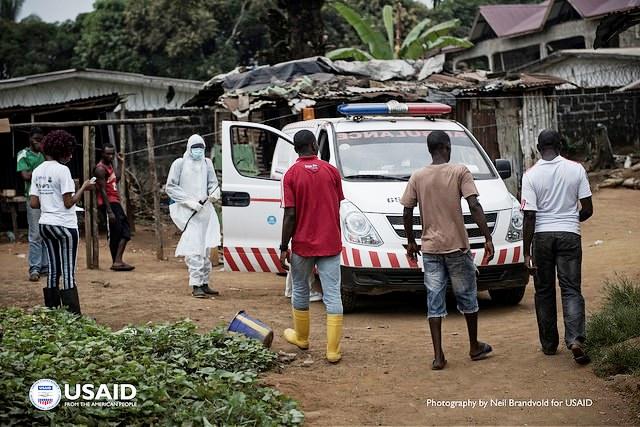The Ebola patterns in West Africa showed a mixed picture last week, with a drop in Guinea's cases, stalled progress in Sierra Leone, and responders still finding sick and dead people in the community who aren't known contacts of earlier cases, the World Health Organization (WHO) said today.
Overall, 99 new confirmed cases were reported in the region last week, compared with 128 the previous week, the WHO said. The total of confirmed, probable, and suspected cases is now at 23,694 in the three countries, with the death toll rising to 9,589.
Country-specific patterns
Guinea, where cases have risen and fallen several times during the outbreak, reported 35 new confirmed cases last week, down from 52 the week before. Most of them occurred in the western part of the country, including the capital, Conakry. A few cases are still being reported other parts of the country that border Senegal and Ivory Coast.
The WHO said nearly a third of Guinea's districts reported at least one security incident last week, often fueled by rumors that response activities are spreading the virus. It added that the problems in engaging with communities are making contact tracing difficult, contributing to people still getting sick and not being isolated and cared for in treatment centers.
However, the WHO said two numbers it watches—Ebola deaths outside of treatment centers and unsafe burials—were lower in Guinea last week than the one before.
The country reported two more Ebola infections in health workers, in Conakry and one in Coyah.
In Sierra Leone, the steep drop that occurred in January has stalled, with the country reporting about 60 to 100 confirmed cases each week, the WHO said. It reported 63 cases last week, and the WHO said new cases were added to its total for the previous week, after missing lab data were included.
A sharp increase in the northern district of Bombali, where 20 cases were reported, was responsible for a chunk of Sierra Leone's new cases, with neighboring Kambia and Port Loko districts also reporting persistent Ebola transmission. Fourteen new cases were reported in Freetown, and a recent cluster of cases in the capital's Aberdeen fishing community are linked to Bombali district's surge of cases, according to the WHO.
Transmission in Sierra Leone is classified as widespread, with most cases in the west, but with transmission occurring in other parts of the country, including Kenema and Kono districts in the east.
Community engagement in Sierra Leone is still a problem, with unsafe burials and infections detected in dead bodies found in the community, the WHO said. One new infection was reported in a health worker.
Liberia's Ebola transmission continues at very low levels, with only one new confirmed case last week, in a registered contact who is part of a transmission chain in Monrovia, the WHO said. Montserrado and Margibi are the only Liberian counties to report confirmed Ebola cases in the last 38 days.
Other developments
- Craig Spencer, MD, who got sick with Ebola in New York City after serving with Doctors without Borders (MSF) in Guinea, today said he understands the fear of the disease from personal and public perspectives, but harshly criticized how he and other responders have been treated by the media and politicians. He detailed his experience with the illness and its repercussions in a perspective piece in the New England Journal of Medicine (NEJM). He said he hadn't been symptomatic when he returned and rode the subway, went out to eat, and went bowling—just depressed and exhausted. "People excoriated me for going out in the city when I was symptomatic, but I hadn't been symptomatic—just sad," he wrote. Spencer said he understands the country's fear, because he feared the disease himself, but the media and politicians missed a chance to explain the science of the disease. "Instead they spent hours retracing my steps through New York and debating whether Ebola can be transmitted through a bowling ball," he wrote. Strict quarantine measures in several states reflected election politics, eroding trust in the public health system because officials didn't follow scientific advice and undermining efforts to recruit more volunteers to go to West Africa, Spencer added.
- Liberia's government, along with the World Bank and Japan, today launched a $3 million project to address the psychological impact of the Ebola epidemic and promote psychosocial health, according to a statement today from the World Bank. The 3-year project is expected to reach 18,000 people in Montserrado and Margibi counties. The project will include a new group of mental health clinicians that will be deployed to schools and will enable the country to hire and train more mental health providers.
See also:
Feb 25 WHO situation update
Feb 25 World Bank statement
Feb 25 NEJM perspective


















